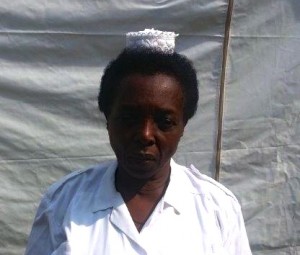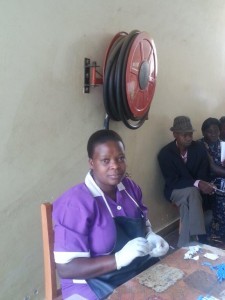Ugandan nurses spearhead HIV testing and counseling services

By Dr. Keith Baleeta, Julian Natukunda, University Research Co./ USAID SUSTAIN Project and Irene Biraro-Seguya, Initiatives Inc.
A core challenge to fighting HIV in Uganda, as elsewhere in the developing world, is the diligence of overburdened frontline healthcare workers in getting people to test for HIV, and enrolling those who test positive, in treatment and care services.
At the Fort Portal Regional Referral Hospital in western Uganda, nurses were equipped with skills for using the provider-initiated testing and counseling approach to test clients, through the USAID and PEPFAR-supported Strengthening Uganda’s Systems for Treating AIDS Nationally (SUSTAIN) project. This has resulted in progressively increasing numbers of clients receiving HIV testing and counseling services.
Fort Portal Regional Referral Hospital serves more than 2.5 million people who live in Uganda’s Rwenzori region and part of eastern Democratic Republic of the Congo. Health workers at the hospital’s outpatient department—like Annet Kamuli, Priscilla Kezaabu and Sister Rwabogo—provide health care services to an average of 250 patients daily. These three women were among those selected to spearhead the delivery of HIV testing services. The three, together with other trained teams at the hospital hold monthly meetings to assess performance and discuss potential barriers and innovations for effective implementation. They identified three important changes in the service delivery process that would improve provider-initiated testing and counseling at different service delivery points:
Ensuring timeliness: Effective HIV testing and counseling necessitates reducing patient waiting times within the clinic. Teams not only committed to reporting to work on time, they also developed a schedule for HIV testing and counseling services to begin an hour before all other services, enabling clients eligible for testing to be seen early and given their results before being attended to by clinicians.
Reducing healthcare provider workload: Expert clients and volunteers were identified to support health workers with simple tasks such as updating client registers and escorting identified HIV-positive clients to the hospital’s antiretroviral therapy clinic to be enrolled in the HIV care and treatment program.
Delivering quality services: During the monthly meetings, performance data is reviewed, gaps identified and changes to close the gaps designed and introduced in the implementation process. Sister Rwabwogo and a smaller team – comprising her colleagues – were nominated to conduct support supervision of provider-initiated testing and counseling services at every service delivery point.
Results
The number of clients accessing HIV testing and counseling services at Fort Portal Regional Referral Hospital progressively increased from 1,786 clients in January 2013 – only 31% of their monthly target – to 7,589 clients in November – 130.8% of their monthly target (see graph below).
The USAID/SUSTAIN project is now working closely with the Ugandan Ministry of Health to consolidate institutionalization of use of the provider-initiated testing and counseling approach to ensure that all clients eligible for HIV testing across 14 other tertiary-level healthcare facilities in the country do get the service.
Sadly, Sister Rwabwogo passed-on in February 2014. Initiatives, Inc. and all partners helping to implement the USAID/SUSTAIN project honor the leadership of Sister Rwabwogo, who exemplified the power of dedicated trained and supported frontline health workers to empower clients to access HIV treatment and care and prevent new infections.



